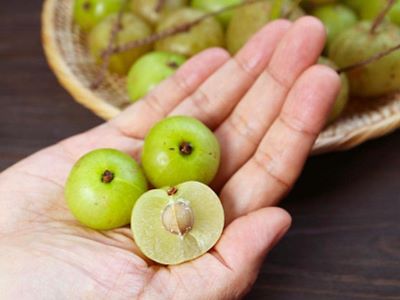Gooseberries are small, round, green or red berries that grow on shrubs in temperate regions. They have a sweet yet tart, refreshing taste enjoyed by many people raw, cooked, or processed into jams and desserts. But “Can Dogs Eat Gooseberries?“
This article explores the key considerations around feeding gooseberries to dogs. It analyzes nutritional components that may benefit dogs versus compounds that could cause issues.
Backed by veterinary guidance and research, we will outline which types of gooseberry preparations may be appropriate to add to a dog’s diet and in what quantities.
Overall this will enable dog owners to make informed decisions about sharing gooseberry treats with furry friends.

What are Gooseberries?
They originated from the native America and the parts of the Northern Hemisphere. They are “tart” fruits, only used in cooking and baking. Gooseberries had other species that were also used as ornaments grown from your garden in the backyard.
They are the types of berries that grow on shrubs. People like to eat them when they are ripped and then they could be used in making pies and jellies, and could also be preserved for longer periods than the other fruits.

They are often confused with a few other similar-looking berries, so the confusion arises that usual pet parents suffer to answer, “Can Dogs Eat Gooseberries?“
What are the Types of Gooseberries?
Gooseberries look a lot like ground cherries. People often get confused between these two fruits as they even taste similar. And in some places, the ground cherries are also called as cape gooseberries. It looks like a green grape, but cape gooseberries and ground cherries have husks.
Now, there are Goldenberries which are practically the same cape gooseberries. You may say that’s just another nickname for these tiny berries. But the only catch here is that these berries are native to South America, hence they aren’t even grown in the same hemisphere.
Are Ground Cherries Suitable for Dog Treats?
Giving ground cherries to your pet is still not a good idea, even as an occasional treat. These cherries are not at all considered to be a healthy snack. Unripe cape gooseberries/ground cherries contain Solanine a toxin that can cause cramping and lead to diarrhoea and could be fatal in rare cases.

Are Golden Berries Suitable for Dog Treats?
Sadly, these delicious berries are also not digestible to dogs. Most dogs don’t like them because of their strong acidic taste. Since it is not a safe option for them either, it is easier for the pet parents to take care of their pets to not eat them mistakingly.
What are Indian Gooseberries?
Scientifically known as Phyllanthus emblica they are a part of the Phyllanthaceae family and Phyllanthus genus. These are typically called “Ambla” and are an important medicinal plant in Ayurveda (the traditional Indian system of medicine).

Can Dogs Eat Amla?
Like the original Gooseberries, these too are just tart berries that could cause health problems for some dogs. Some people who practice medicine might suggest giving their dogs an amla, but you should talk to your veterinarian before providing it with any new fruit or treat that might lead to serious health issues.
Can Dogs Eat Gooseberry
The short answer would be no. Even if you grow these berries in your compound, these berries in any form could be toxic to dogs. Not every dog breed has the same characteristics and so do the fruits or in this context, berries.
The Native American Berry “Gooseberry” is not suitable for canines, as it contains both malic and citric acid and could make your dog experience symptoms that are a lot like food poisoning.
Dog parents should refrain from giving Gooseberries to their pets. These berries could create an intestinal issue and gastric issue for the dog, which could make them vomit and have diarrhoea. They also have glyoxylic acid, which will again react with your dog’s stomach and create oxalic acid inside.
The whole bizarre scenario, will not let your dog absorb calcium for a few days. Which could result in being too weak to even bear the pain. Dogs have sensitive stomachs and these berries could irritate the whole functioning of their digestive system.
Do not give your dogs gooseberries.
What Should I Do If My Dog Ate A Gooseberry?
While surveys and reports show that the ingestion of gooseberries doesn’t prove fatal for dogs, there might be some chronic long-term intestinal or digestion issues tied to it. Not all negatively affecting eatables for our dogs have an immediate effect.
We can create issues for our dogs in the future without even knowing it. We all want our companions to be around for as long as possible. With so many other healthy fruits and vegetables available, Gooseberry is not worth the risk. With that being said, don’t intentionally feed gooseberries to your dogs. Should they ingest a gooseberry on accident, seek an emergency.
You can also wash your dog’s mouth out with water while consulting your veterinarian for the next probable steps before rushing your pet to the clinic. If you live in an area near Gooseberry bushes, discuss it with your veterinarian and have a backup plan in case ingestion occurs.
Can Dogs Have Parts of Gooseberry Plants?

Another question that might arise is if the parts like leaves and stems could be fed to your pets, if not the fruit/berry itself. And the answer would remain, no. Although the flowers, leaves and stems still have similar dietary values and benefit them, unfortunately, we could not feed any part of it to our dog.
Maybe you have heard that gooseberries are a good source of vitamins and minerals. But that just works for humans and has no prior advantages for dogs. They’re good in Vitamin C and Vitamin E but only humans can absorb the nutrients from them.
Dogs can even suffer from kidney stones and have problems that could even affect their heart. Other heat-related problems will still be an additional problem for the dog parents themselves.
FAQs
Can Dogs Eat Gooseberries?
While gooseberries are generally safe for dogs in moderation, some caution is advised. Always remove the seeds and stems, as they can be potential choking hazards. Additionally, monitor your dog for any signs of allergies or digestion upset when introduced to new foods.
Can puppies eat gooseberries?
Puppies have sensitive stomachs, so it’s advisable to introduce new foods gradually. Small, mashed portions of gooseberries can be given in moderation. Consult your veterinarian for personalised advice based on your puppy’s age, breed and type.
How many gooseberries are safe for dogs?
The key is moderation. A few gooseberries as an occasional treat are generally safe for most dogs. However, the exact amount depends on your dog’s size, breed and overall health. Always observe for any adverse reactions and adjust the quantity accordingly.
What to do if my dog eats too many gooseberries?
If your dog consumes an excessive amount of gooseberries, monitor them for signs of stomach infections, vomiting, or diarrhoea. Contact your veterinarian if symptoms persist or become worse. It’s crucial to act promptly to ensure your dog’s well-being.
Are there alternative berries for dogs?
Yes, several dog-friendly berries can be offered as treats. Blueberries and strawberries are popular choices. Always introduce new fruits gradually and in moderation to prevent any adverse reactions.
Conclusion
As we have discussed our queries and concerns related to “Can Dogs Eat Gooseberries?“. It is not a good idea to let them even be near a Gooseberry Plant. It is better to somehow give them treats that have low sugar intake and a balanced diet that will fulfil your pet’s needs and nutrition.
Indian Gooseberries or Amla are similar berries with similar qualities and one should refrain from giving it directly to their pet as a snack.
References:
- What Are Safe Fruits for Dogs to Eat? | WebMD



